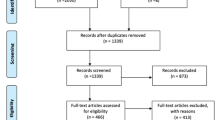Abstract
Three participants with autism were taught to answer a cell phone and to follow directions to seek assistance when lost in community settings. During baseline, none of the participants answered a cell phone or sought assistance. Following instruction at school and in the community, all participants learned to answer the cell phone and follow instructions to seek assistance from a naïve adult by exchanging a communication card. Generalization probes were conducted in non-training community sites and with the participants’ parents. Data also were collected on the responses of naïve community members to determine the social validity of the participants’ assistance-seeking skills. Results are discussed in terms of the importance of teaching community safety skills to individuals with autism and the challenges of teaching these responses to individuals with severe communication and social deficits.
Similar content being viewed by others
References
Bryen, D. N., Carey, A., & Friedman, M. (2007). Cell phone use by adults with intellectual disabilities. Intellectual and Developmental Disabilities, 45, 1–9.
Carey, A. C., Friedman, M. G., & Bryen, D. N. (2005). Use of electronic technologies by people with intellectual disabilities. Mental Retardation, 43, 322–333.
Collins, B., Wolery, M., & Gast, D. (1991). A survey of safety concerns for participants with special needs. Education and Training in Mental Retardation, 26, 305–318.
Harris Poll (2008). Cell Phone Usage Continues to Increase. Retrieved July 2, 2008, from http://www.harrisinteractive.com/harris_poll/index.asp?PID=890.
Johnson, B. M., Miltenberger, R. G., Knudson, P., Egemo-Helm, K., Kelso, P., Jostad, C., & Langley, L. (2006). A preliminary evaluation of two behavioral skills training procedures for teaching abduction-prevention skills to schoolchildren. Journal of Applied Behavior Analysis, 39, 25–34.
Taber, T. A., Alberto, P. A., Hughes, M., & Seltzer, A. (2002). A strategy for participants with moderate disabilities when lost in the community. Research and Practice for Persons with Severe Disabilities, 27, 141–152.
Taber, T. A., Alberto, P. A., Seltzer, A., & Hughes, A. (2003). Obtaining assistance when lost in the community using cell phones. Research and Practice for Persons with Severe Disabilities, 28, 105–116.
Taylor, B. A., Hughes, C., Richard, E., Hoch, H., Rodriguez-Coello, A. (2004). Teaching teenagers with autism to seek assistance when lost. Journal of Applied Behavior Analysis, 37, 79–82.
Wade, T. K., & Troy, J. C. (2001). Mobile phones as a new memory aid: A preliminary investigation using case studies. Brain Injury, 15, 305–320.
Author information
Authors and Affiliations
Corresponding author
Additional information
Thanks to Sam, Jack, Michael and their parents for participation in this study. Special thanks to Kate Britton for her help in administering the Vineland Adaptive Behavior Scales, and to the Alpine Learning Group teachers who assisted with data collection.
Rights and permissions
About this article
Cite this article
Hoch, H., Taylor, B.A. & Rodriguez, A. Teaching Teenagers with Autism to Answer Cell Phones and Seek Assistance When Lost. Behav Analysis Practice 2, 14–20 (2009). https://doi.org/10.1007/BF03391733
Published:
Issue Date:
DOI: https://doi.org/10.1007/BF03391733




